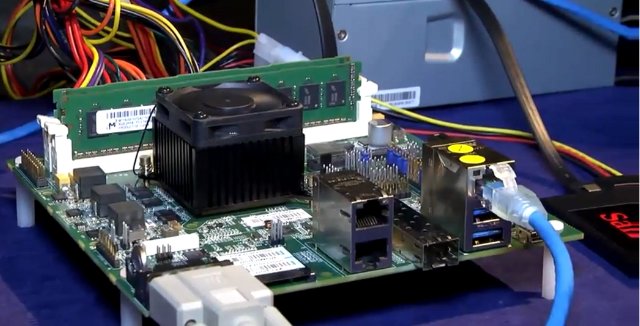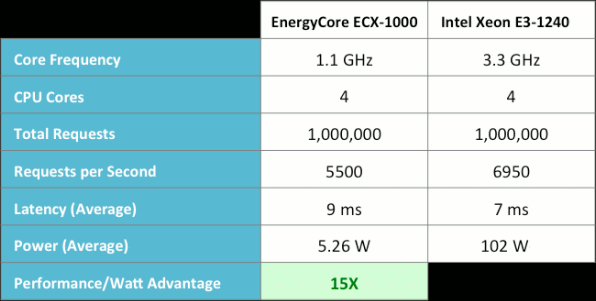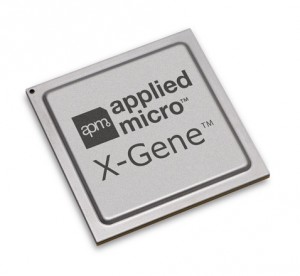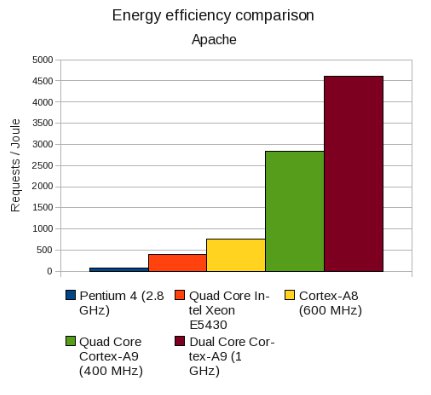Applied Micro announced X-Gene 64-Bit ARMv8 Server-on-Chip at ARM Techcon 2011, and later in 2012, they showcased Apache2 on an FPGA implementation of the chip. More recently, they showcased KVM (Kernel-based Virtual Machine) on their X-C1 hardware platform with an actual X-Gene SoC at Linaro Connect Europe 2013, and Linaro has just uploaded the video of the demo. The development board features 8 ARMv8 64-bit processors, PCI network, up to 6 SATA drives (but only one used in the demo), and they also have hardware fitted into a 1U rack. The demo below runs 4 SMP Linux virtual machines (with 2 VCPUs), including 2 ARMv7 32-bit, and 2 ARMv8 64-bit guests, running web servers concurrently on each VM using VirtIO-based network virtualization. Jean-Luc Aufranc (CNXSoft)Jean-Luc started CNX Software in 2010 as a part-time endeavor, before quitting his job as a software engineering manager, and starting to write daily news, and […]
ARM vs x86 Servers Benchmark – Calxeda EnergyCore ECX-1000 vs Intel Xeon E3-1240
Calxeda has released the results of ApacheBench benchmark comparing their ARM-based EnergyCore solution to an Intel Xeon server in order to showcase the performance and the much lower power consumption of their servers. Here’s the setup: Hardware: Single Calxeda EnergyCore ECX-1000 @ 1.1 GHz, 4 GB of DDR3L-1066 memory, 1Gb Ethernet network port and 250 GB SATA 7200rpm HDD Intel Xeon E3-1240 @ 3.3 GHz, 16 GB memory and 1Gb Ethernet network port. No info on hard drive provided Software: Ubuntu Server v12.04 Apache Server v2.4.2 ApacheBench v2.3 (16k request size) They performed power measurements every 2 seconds and averaged the results. Power supply overhead and hard drive power consumption were not excluded in the measurement, but the entire SoC and DDR memory power consumption were included together. For the Intel server however, they could not measure directly, so they used published TDP values for the CPU (80 W) and I/O […]
AppliedMicro Unveils ARMv8 64-bit Apache 2 Implementation for X-Gene SoC
Last year, Applied Micro announced their Gene-X 64-bit ARMv8 core at ARM Techcon 2011, and showed a minimal demo based on Xilinx Virtex-6 FPGA booting Linux ARM 64-bit to the command line. Since then, the company has made progress and just announced the availability of an Apache 2 web server implementation on their 64-bit ARMv8 X-Gene Server-on-Chip. This is the very first implementation of a fully-functional server platform running a real-world application on 64-bit ARM-based processor, said Vinay Ravuri, Vice President and General Manager of Processor Products at AppliedMicro. The platform is now capable of running a full LAMP (Linux, Apache, MySQL and PHP) software stack. Back in 2011, the company announced ARMv8 support for Linux would be developed by Redhat and be available in Fedora. This 64-bit ARM web server implementation enable OEMs, ODMs, Cloud Service Providers, Independent Software Vendors and other development partners to conduct early stage performance benchmarking and […]
Energy Efficiency of ARM Architecture for Cloud Computing Applications
Following “Pandaboard Cloud Cluster Running Google App Engine” post, there were some questions regarding the actual power efficiency of ARM servers vs Intel (Xeon) servers and some commenters questioned the performance of ARM chips. I’ve found a thesis evaluating how the energy efficiency of the ARMv7 architecture based processors Cortex-A9 and Cortex-A8 compares – in applications such as a SIP Proxy and a web server (Apache2) – to Intel Xeon processors. The focus of this thesis is to compare the energy efficiency between the two architectures rather than pure performance where the Xeon largely outperforms ARM processors, although a cluster of ARM servers could be used instead to reach the same processing power. Depending on the application, benchmarks indicate energy efficiency of 3-11 times greater for the ARM Cortex-A9 in comparison to the Intel Xeon. The full thesis (74 pages) is available below. Jean-Luc Aufranc (CNXSoft)Jean-Luc started CNX Software in […]
Open Source Licenses Overview: GPL, LGPL, Apache, BSD,…
The great thing about open source code is the large amount of high quality code that is available and many embedded projects use FOSS code as it really speeds up development time. What is not often taken into account are the licenses for the code. Many companies often simply ignore licenses issues and some even go one step further by obfuscating the code to work around dual license issues or to hide the use of a particular open source library. Even though history shows that few companies get sued due to open source license infringements and release of open source code modified in commercial projects often requires the community involvement, open source licenses should still be taken into consideration as the risk still exists. I’ll give an overview of open source licenses in this blog post, as well as recommendation on how to keep your proprietary code closed. Definition of […]







